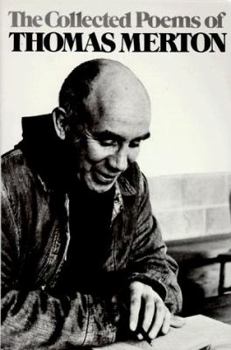The Collected Poems of Thomas Merton
Select Format
Select Condition 
Book Overview
In 1944, New Directions brought out Thomas Merton's first book of verse. By the time of his tragic, untimely death in 1968, Father Louis (as he was known at the Trappist monastery where he lived for twenty-seven years) had published upwards of fifty books and pamphlets, including several more collections of poetry. All of these poems have been assembled in a single, definitive volume (first published by New Directions in 1977) which includes much additional unpublished or uncollected material drawn from the archive of the Merton Studies Center at Bellarmine College in Louisville, Kentucky, or supplied by the poet's friends and associates. Brought together in The Collected Poems of Thomas Merton are: Early Poems (1940-42, published posthumously in 1971), Thirty Poems (1944), A Man in the Divided Sea (1946), Figures for an Apocalypse (1947), The Tear of the Blind Lions (1949), The Strange Islands (1957), Original Child Bomb (1962), Emblems of a Season of Fun (1963), Cables to Ace (1968), and The Geography of Lograire (completed in 1968 and published posthumously). These are followed by Sensation Time at the Home and Other New Poems, a book which Merton completed shortly before his death. There are also sections of uncollected poems, humorous verse, poems written in French, with some English translations, Merton's translations of poetry from various languages, drafts and fragments, and a selection of concrete poems. With the availability of The Collected Poems of Thomas Merton as a New Directions paperbook, an ever wider audience may more fully appreciate the impressive range of the poet's technique, the scope of his concerns, and the humaneness of his vision.
Format:Paperback
Language:English
ISBN:0811207692
ISBN13:9780811207690
Release Date:September 1980
Publisher:New Directions Publishing Corporation
Length:1058 Pages
Weight:3.05 lbs.
Dimensions:1.9" x 6.0" x 9.0"
Customer Reviews
3 ratings
A Life as a Picaresque Symphony
Published by Thriftbooks.com User , 19 years ago
This is a book for all seasons. It chronicles Merton's poetic career from start to finish, which close up can seem to change and veer abruptly. From the distance of this chronicle it looks more like the regular flow of those low domed hills his monastery calls home, the Kentucky knobs. Working in an astonishing variety of modes and moods, the care and control of Merton's poetic output is consistent and always thoughtful, respectful of the reader. Merton started recording his haunted poetic impressions of the modern world in the years at Columbia just leading up to his conversion. A sample is collected here, leading up to a struggle with a view of a wintry Lent which, developed in a slightly different vein, becomes "Lent in a Year of War," the keynote to his first published set, Thirty Poems. The resurrection of the fragment before the first book gives an astonishing window on Merton the man, the poet, the monk, the later social critic and protester: they were all the same guy, and they were there from day one. He did not "turn from the world" then later "turn to it" as the editors of his complete journals suggest. He never left it and carried its issues with him more deeply into ground, as it were, where they ripened over time. Lent is an "evening of sinless murders" the young man annouces, an image fusing the precise matrix in the modern world that he set his spiritual-poetic career against, with some note of active determination -- not passivity. There are four published sets between 1944 and 1949. They still constitute a vast ground for explication and sensitive critical commentary, for which there is hardly room in a review. However, these four sets are rich and classically constructed poems which even, without the rest of the book, would make the short list for anybody's desert island. Now the sounds and sights and prayers of monastic days fuse with that long and bottomless meditation on the world and time that Merton craved, and that a career in teaching with a Columbia degree could not have begun to satisfy -- or at least not without deadly struggle -- as anyone who works in the world must know. But the key thing again is religious imagery not as a shelter or a denial or a flight, but as a full frontal explication of the issues that drove this poet "underground," so to speak. In "Ode to the Present Century" it is modern man who is crucified, demonically on his own most cherished petards: How have you hammered all your senses into curses, Forever twisting in your memory The nails of sensuality and death. An eight year hiatus follows, ending with the transitional The Strange Islands in 1957. Then the Original Child Bomb in 1962, and the explosion of his own poetic output that followed right up to Merton's accidental death at age 53 in 1968. These poems are more generally known, and take on many contemporary issues -- still burning -- with both hands in any mode Merton can get ahold of. They are wild and som
A Must for the Merton Fan
Published by Thriftbooks.com User , 26 years ago
Although a mystic and an intellectual, Merton shines as a poet as well. Rarely spoken of, his poetry reflects his simple and eloquent beliefs regarding God. To read his poetry is to glimpse a bit of the Truth that he sought to explain.
Poems for a lifetime of reflection and contemplation
Published by Thriftbooks.com User , 27 years ago
The greatest purveyor of paradoxes since Chesterton writes poems reminiscent of Thoreau and Whitman in a style used by the Beat poets. This new age spiritual guru shows us through his poetry just how much literary talent he had. His poems, both literary and spiritual, are as well crafted as his spiritual works. This is a must for any serious Merton reader.





